Pacific consultations underway to shape PACER Plus 2026-2030 Work Programme

APIA, Samoa – The PACER Plus Implementation Unit (PPIU) has begun a series of in country consultations with its member Parties from 2 February to 20 March 2026. The consultations will inform the development of the 2026-2030 Development and Economic Cooperation (DEC) Work Programme, ensuring it aligns with national priorities and supports effective implementation of PACER Plus. The PPIU team is visiting all ten member Parties to PACER Plus, Australia, Cook Islands, Kiribati, New Zealand, Niue, Samoa, Solomon Islands, Tonga, Tuvalu and Vanuatu, to gather baseline data, identify priorities, and confirm areas where support is most needed. PPIU team in discussion this week with officials in Honiara, Solomon Islands, during consultations to identify national priorities for the 2026-2030 Work Programme. Consultations in Tonga and Kiribati have already been completed, with meetings underway this week in Solomon Islands and Vanuatu. A key focus of the consultations is strengthening Monitoring, Evaluation, Learning and Adaptation (MELA) systems through the MELA Logical Framework. This framework enables member Parties to track delivery, measure results, and ensure activities under the Work Programme contribute directly to implementation of PACER Plus. To support this, the PPIU is working with each country’s National Focal Point and Component Contact Points to update the PACER Plus Implementation Tracker, a structured data collection tool that helps countries record progress, establish baselines, and set practical targets through to 2030. The baseline assessments will guide the identification of priority areas in the first Annual Plan for 2026-2027. PPIU team meets with officials in Kiribati as part of in-country consultations to help shape the 2026-2030 DEC Work Programme. Head of the PPIU, Roy Lagolago, said the consultations are grounded in setting the right foundations for the next four years: “While this might be a lot of work, getting the foundations right from the start is vital. The PPIU is a member driven organisation and the voice of all our members are important to us. These consultations allow us to sit down with each member to understand their priorities and agree on clear targets for the next four years. We want the 2026–2030 Work Programme to be practical, measurable, and genuinely useful to our members.” He added that strengthening monitoring and compliance systems will give members clearer evidence of progress and impact. “As we move into this new phase under the DEC Arrangement, our focus is on results not just activities but real outcomes that support trade, economic growth, and development across the Pacific.” Roy Lagolago, Head of PPIU The PPIU will finalise baseline assessments following the consultations, with the draft 2026–2030 Work Programme to be presented to PACER Plus members at the next Joint Committee meeting to be held in Tonga in May 2026. -ENDS- More articles like this one
New Five-Year PACER Plus Support Agreed by Pacific Ministers
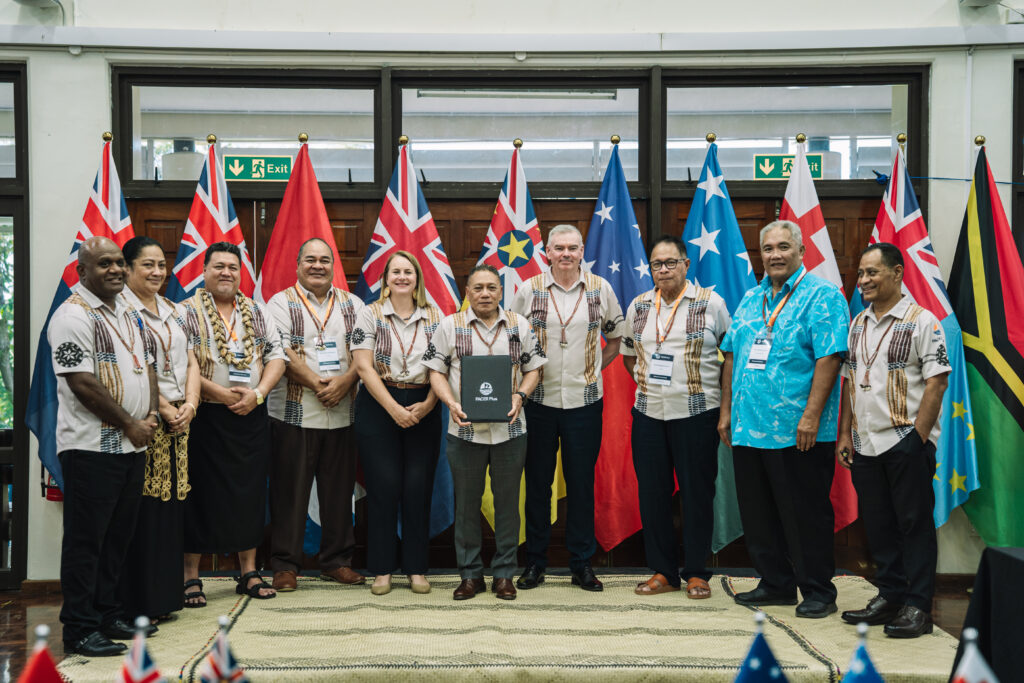
HONIARA, Solomon Islands – Pacific trade ministers met in Honiara, Solomon Islands yesterday and agreed on a renewed push to strengthen trade, investment, and labour mobility across the region under the Pacific Agreement on Closer Economic Relations Plus or PACER Plus. Ministers and ministerial representatives from Australia, Cook Islands, Kiribati, New Zealand, Niue, Samoa, Solomon Islands, Tonga, Tuvalu, and Vanuatu came together for the 2025 PACER Plus Ministerial Meeting, chaired by Hon. Peter Shanel Agovaka, Solomon Islands Minister of Foreign Affairs and External Trade. Ministers and ministerial representatives from the 10 PACER Plus parties came together for the 2025 PACER Plus Ministerial Meeting in Honiara on Thursday 27 November. Opening the meeting, Prime Minister Hon. Jeremiah Manele highlighted the progress made since PACER Plus entered into force in 2020. PACER Plus is grounded in a rules-based system. The Agreement embodies these multilateral principles that respects sovereignty while promoting shared benefits of trade and economic integration. It also addresses the unique and diverse economic vulnerabilities of Pacific small island developing states and offers a structured path for our people to integrate and adapt to the global trading system. It remains an important framework to grow regional peace, progress and prosperity in the region. Prime Minister Jeremiah Manele Ministers reviewed the first five years of the Development and Economic Cooperation (DEC) Work Programme and acknowledged how the work programme had supported policy reforms and institutional capacity building, while also responding to specific national needs, especially for small island economies facing ongoing economic and climate pressures. Looking ahead, the ministers endorsed the strategic priorities for the next phase of the DEC Work Programme (2025-2030). The new priorities will focus on legislation and policy reform, public sector capacity building, private sector development, and automation and data systems. The next phase aims to create a more predictable trading environment, help businesses become more competitive, and ensure Pacific countries have the tools they need to meet their PACER Plus commitments. The ministers also acknowledged the central role played by the PACER Plus Implementation Unit (PPIU) in driving the significant progress achieved under the DEC Work Programme 2020-2025. They understood the importance of the PPIU as a standalone, member-driven regional entity, one that supports Parties to build economic resilience, deepen cooperation, and advance sustainable development across the Pacific. Ministers also reaffirmed the Pacific Labour Mobility Annual Meeting as the region’s main forum for advancing labour mobility issues. Australia and New Zealand announced major new support for the next five-year DEC Work Programme – AUD 23.2 million from Australia and NZD 10 million from New Zealand. A key highlight from yesterday’s meeting was the joint announcement by Australia and New Zealand of renewed funding for the next five-year cycle of the DEC Work Programme – AUD 23.2 million from Australia and NZD 10 million from New Zealand. Ministers welcomed this commitment and proceeded to sign the Phase II Implementing Arrangement for Development and Economic Cooperation (2025-2030). The meeting also agreed to increase their engagement with other Forum Island Countries that have expressed interest in joining PACER Plus. Ministers endorsed the development of a structured advocacy strategy under the next phase of the DEC Work Programme to support future accessions, with a commitment from Australia and New Zealand to provide additional assistance as membership expands. Finally, ministers expressed their deep appreciation to the government and people of Solomon Islands for hosting the meeting and for their warm hospitality. Tonga will chair the next PACER Plus Joint Committee and Ministerial Meetings in 2026. The full PACER Plus Ministerial Communique can be accessed here. -ENDS- More articles like this one
Pacific Ministers to Endorse the Next Five Years of PACER Plus Development and Economic Cooperation
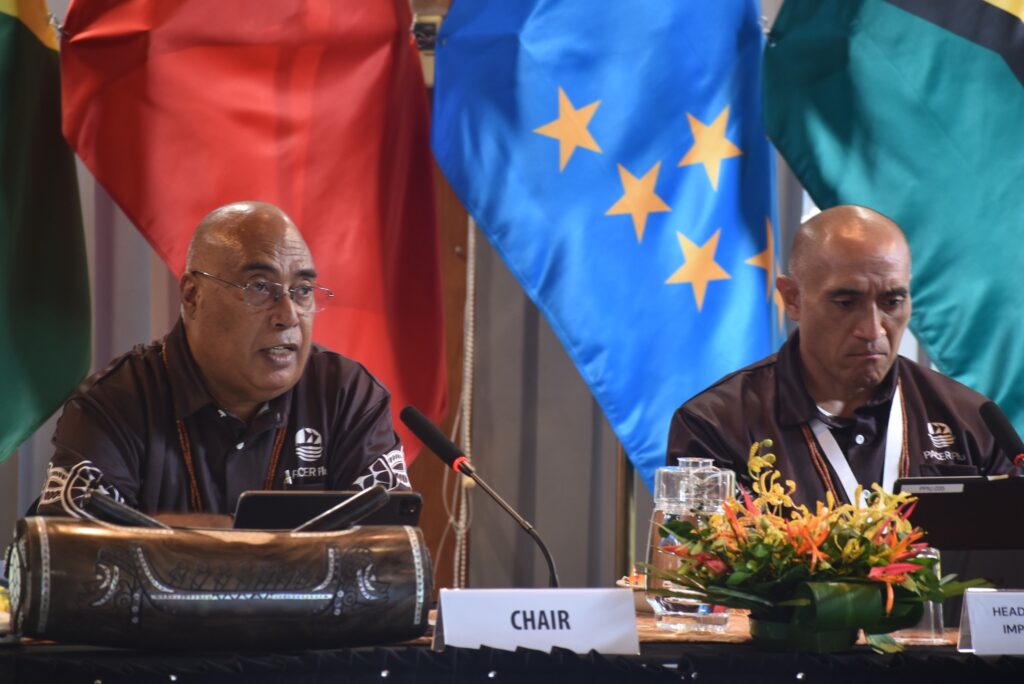
HONIARA, Solomon Islands – Government ministers and senior officials from around the Pacific will gather in Honiara, Solomon Islands, from 25-27 November for the Ninth PACER Plus Joint Committee Meeting and 2025 PACER Plus Ministerial Meeting. Representatives from the PACER Plus Parties – Australia, Cook Islands, Kiribati, New Zealand, Niue, Samoa, Solomon Islands, Tonga, Tuvalu, and Vanuatu – will attend the three-day meeting. Ambassador Collin Beck (left) with Mr. Roy Lagolago at the Eighth PACER Plus Joint Committee Meeting in Honiara, Solomon Islands. The meetings will conclude on 27 November with the PACER Plus Ministerial Meeting, which will be officially opened by the Prime Minister of Solomon Islands, Hon. Jeremiah Manele. This year’s gathering comes at an important moment for the region. Ministers and officials will consider a report on the first phase of the Development and Economic Cooperation (DEC) Work Programme, which has been jointly funded by Australia and New Zealand since 2020 to help Pacific Island countries implement the PACER Plus (the Agreement). Over the past five years, the DEC Work Programme has supported Parties with policy reforms, legislative updates, and institution-building. But it has also increasingly responded to very practical needs such as providing equipment, systems, and tools that help Pacific countries meet their trade commitments and unlock opportunities for businesses. While the programme has achieved significant progress, implementation has not been without its challenges. Countries have had to navigate the pandemic’s lasting impacts, staffing shortages, trade tensions and changing international systems. These lessons have reinforced the need for more targeted support, stronger coordination, and investments that deliver clear, tangible benefits to Pacific economies. Ministers will also consider the next phase of development assistance, including the signing of the next Implementing Arrangement for Development and Economic Cooperation under PACER Plus for another five years. They previously signalled support for this renewal during the 2024 Ministerial Meeting in Brisbane, Australia. Ambassador Collin Beck, Permanent Secretary of the Ministry of Foreign Affairs and External Trade Solomon Islands and the Chair of the PACER Plus Joint Committee Meeting said Solomon Islands is proud to host the meetings at a time when regional cooperation and regional integration is critical to unlock our shared prosperity. PACER Plus is not just a trade agreement but a commitment by Pacific nations to work together for an integrated Pacific. As hosts, Solomon Islands is honoured to welcome our Pacific brothers and sisters to Honiara. These meetings will help shape the next chapter of cooperation, ensuring that our region continues to grow, remain connected, and benefit from a fair and predictable trading environment. Ambassador Collin Beck The past five years have also seen major advances in trade facilitation across the region. These include customs modernisation through rollout of ASYCUDA systems; sanitary and phytosanitary improvements including ePhyto for faster, paperless certification; simplified rules of origin and improved border procedures; duty-free access to Australia and New Zealand for Pacific exports; and strengthened labour mobility cooperation, including pilot intra-Pacific initiatives and reintegration support. Mr. Roy Lagolago, Head of the PACER Plus Implementation Unit (PPIU), said these achievements show the value of predictable, well-coordinated regional support. “Over the last five years, we’ve seen real progress like faster customs clearances, better systems for exporters, more streamlined rules, and stronger labour mobility arrangements. Countries are not only meeting their commitments under PACER Plus, but they are also seeing practical benefits on the ground. As we move toward the next phase of the DEC Work Programme, the focus will remain on solutions that make trade easier, support jobs, and strengthen resilience across our island economies,” said Mr. Lagolago. The PPIU, based in Apia, Samoa, manages the DEC Work Programme and supports countries in implementing the agreement. -ENDS- More articles like this one
Modernised customs systems set to streamline trade and reduce border delays
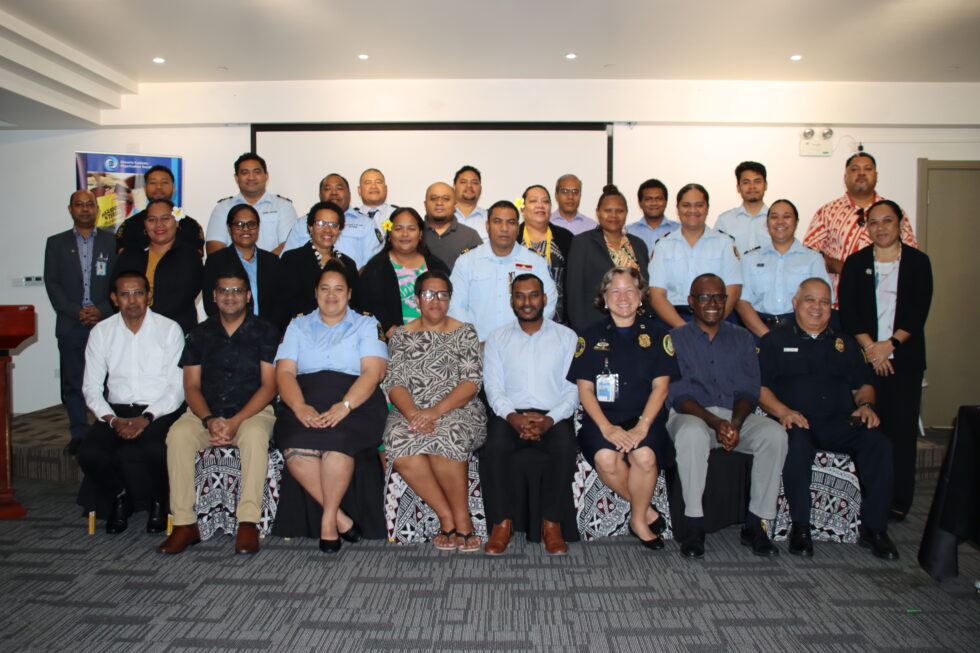
Customs organisations in the Pacific are advancing their digital systems to improve trade activities within the region and the world. The Oceania Customs Organisation (OCO) Secretariat and the PACER Plus Implementation Unit (PPIU) concluded a four-day Digital Customs Workshop in Nadi, Fiji, bringing together 23 participants from 15 member countries to chart a course towards paperless, efficient border operations. The ‘Digital Customs Workshop: Advancing Trade Facilitation and Modernisation through Technology’ was an initiative by OCO seeing that its members were making great strides in automating border processes. The workshop, held from October 27-30, highlighted the key principles of Digital Customs which was predictability, transparency and efficiency addressing growing concerns of trade delays and inefficiencies that have long plagued Pacific commerce. The four-day Digital Customs Workshop in Nadi last month, brought together 23 participants from 15 countries. PACER Plus Trade Advisor Alipate Tavo stressed the importance of customs’ digital transition for regional development. “Digital customs is a fundamental pillar for enabling trade facilitation and transparency. Through partnerships like this, PPIU continues to support the region in building the digital infrastructure and capacity required for modern customs and trade systems,” Mr. Tavo said. OCO Trade and Revenue Management Advisor Sumeet Singh said regional teamwork is essential for successful digital upgrades. “Going digital is the key to modernising customs. It’s all about being transparent, fast and trustworthy. As Pacific nations, we need to work together on systems that don’t just connect our borders — they should boost our economies too,” Singh said. The initiative aligns with international standards including the Revised Kyoto Convention, World Trade Organisation Trade Facilitation Agreement and supports the implementation of the Pacific Regional Trade Facilitation Strategy. The workshop featured presentations from the United Nations Conference on Trade and Development, UN Economic and Social Commission for Asia and the Pacific, and Pacific Community. It also provided a platform for OCO members to share and learn from their respective digital Customs journeys. Participants achieved five key outcomes during the workshop. They improved their understanding of digital Customs systems and skills in analysing trade data and also created draft national plans with specific timelines and priority actions for digital transformation. The workshop also helped build the groundwork for important legal changes, including laws for electronic signatures and protecting data. It also strengthened working relationships between regional organisations. More than half of OCO’s 24 members have already computerised their main clearance work representing a major progress towards fully digital Customs operations across the Pacific. Participants also produced an outcome statement of the workshop, which recommended several follow-up actions including consolidating national roadmaps into a regional action plan with bi-annual progress reviews, developing a Digital Customs Legal Readiness Checklist, launching regional cybersecurity initiatives, and establishing sustained digital skills programmes. These recommended actions will enable OCO members to “collectively overcome structural challenges, ensure faster trade flows and build stronger economic resilience for the region”. PPIU Operations and Secretariat Manager Laisiana Tugaga who provided closing remarks at the workshop stressed the importance of working together. Together with our partners, we are laying the foundation for a connected, efficient and paperless Pacific customs community. Laisiana Tugaga, PPIU Operations and Secretariat Manager The workshop represents part of ongoing PACER Plus Development and Economic Cooperation Work Programme efforts to ensure Pacific Island countries benefit equitably from digital transformation in international trade. The digital transformation initiative comes at a crucial time for Pacific trade, as island nations seek to modernise their economies while maintaining competitive advantages in global markets. -ENDS- More articles like this one
Fair Recruitment Key to Sustainable Reintegration, Says Prime Minister Manele at PLMAM 2025 Opening
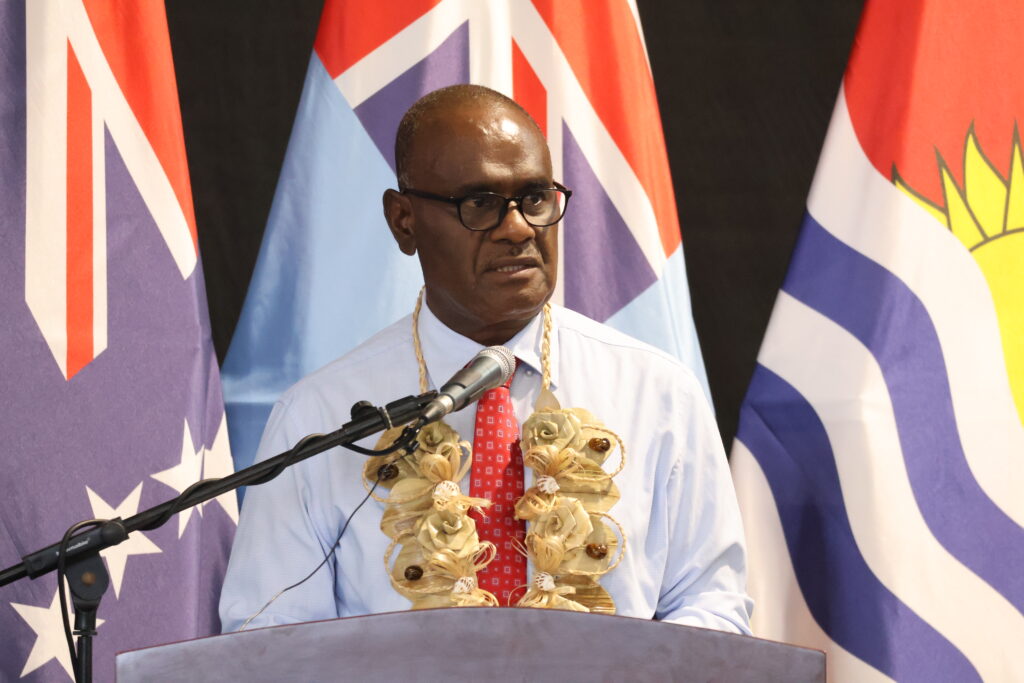
HONIARA, Solomon Islands – The Pacific Labour Mobility Annual Meeting (PLMAM) 2025 officially opened this morning in Honiara, Solomon Islands, bringing together Pacific labour mobility stakeholders from across the Pacific and beyond under the theme ‘Sustainable Reintegration Begins with Fair and Effective Recruitment’. Organised by the PACER Plus Implementation Unit (PPIU), which also serves as the Labour Mobility Secretariat, the PLMAM provides a regional platform for countries to work together on improving recruitment processes, worker welfare, and the long-term benefits of labour mobility for Pacific families and communities. The PLMAM 2025 has drawn participants from Australia, Cook Islands, Fiji, Kiribati, New Zealand, Nauru, Niue, Papua New Guinea, Samoa, Solomon Islands, Tonga, Tuvalu, Vanuatu, as well as Timor Leste and the Philippines. This year’s meeting has drawn participants from Australia, Cook Islands, Fiji, Kiribati, New Zealand, Nauru, Niue, Papua New Guinea, Samoa, Solomon Islands, Tonga, Tuvalu, Vanuatu, as well as Timor Leste and the Philippines. Opening the meeting, Prime Minister of Solomon Islands, Hon. Jeremiah Manele, said the Pacific’s labour mobility programmes have become an important pathway for employment, skills development, and economic empowerment across the region. Labour mobility is not just an economic policy it is a lifeline of opportunity. Thousands of Solomon Islanders have found meaningful work abroad, gained new skills, supported their families, and returned home with renewed hope and experience. Remittances from seasonal workers contributed SB$475 million in 2024 for Solomon Islands. While this may be small in comparison to other Pacific family members, these remittances are of immense significance to our economy. Hon. Jeremiah Manele Prime Minister of Solomon Islands, Hon. Jeremiah Manele, opened the PLMAM 2025. Head of the PACER Plus Implementation Unit and Labour Mobility Secretariat, Mr. Roy Lagolago, said the discussions at PLMAM 2025 would focus on strengthening collaboration between sending and receiving countries to ensure fair outcomes for all parties involved. “Fair and effective recruitment is where sustainable reintegration begins,” said Mr. Lagolago. “When workers are well-prepared, well-supported, and treated fairly throughout their journey, the benefits of labour mobility extend beyond individuals to uplift families, communities, and entire economies.” Over the next three days, PLMAM participants will discuss practical steps to improve worker recruitment, strengthen the partnership between Labour Sending Units and Employers, as well as regional measures to enhance the development impact of labour mobility through sustainable reintegration initiatives. The PLMAM, established under the PACER Plus Arrangement on Labour Mobility, continues to serve as the region’s main platform for cooperation on labour mobility issues and policy coordination between Pacific sending and receiving countries. -ENDS- More articles like this one
Pacific Labour Mobility Annual Meeting 2025 to Convene in Honiara

HONIARA, Solomon Islands – Labour mobility stakeholders from across the Pacific and beyond will gather in Honiara from 3-6 November 2025 for the Pacific Labour Mobility Annual Meeting (PLMAM) 2025, hosted under the theme “Sustainable Reintegration Begins with Fair and Effective Recruitment”. The meeting, organised by the PACER Plus Implementation Unit (PPIU), which also serves as the Labour Mobility Secretariat, brings together participants from PACER Plus Parties including Australia, Cook Islands, Kiribati, New Zealand, Niue, Samoa, Solomon Islands, Tonga, Tuvalu, and Vanuatu, as well as invited representatives from Fiji, Papua New Guinea, and Timor Leste as observers. Other labour mobility stakeholders will also be represented including workers, employers, trade unions, private sector, academia, international and regional organisations. The PLMAM 2025 theme is “Sustainable Reintegration Begins with Fair and Effective Recruitment”. The four-day meeting will provide a platform for open and practical discussions among labour mobility stakeholders including workers, employers, labour sending and labour receiving government officials, international organisations such as the International Labour Organisation, International Organisation for Migration, and the World Bank, and a guest speaker from the Philippines Department of Migrant Workers. The key topics discussed will focus on worker recruitment and sustainable reintegration. Solomon Islands Minister of Foreign Affairs and External Trade, Peter Shanel Agovaka said his government is honoured to host the regional meeting. The Pacific’s labour mobility schemes have brought life-changing opportunities to thousands of our people. But as the numbers grow, so does our shared responsibility to ensure recruitment is fair, ethical, and transparent. Hosting the PLMAM 2025 is a privilege for Solomon Islands and a chance for us all to ensure that the benefits of these programmes are felt not only by workers abroad but also by families, communities and countries. Hon. Peter Shanel Agovaka Head of the PACER Plus Implementation Unit and Labour Mobility Secretariat, Mr. Roy Lagolago, said this year’s theme reflects a growing regional focus on ensuring that the worker journey is fair from start to finish. “Sustainable reintegration starts long before workers board a plane. It begins with how they are recruited, trained, and supported,” Mr. Lagolago said. “The PLMAM provides an important space for sending and receiving countries to work together, share lessons, and make practical commitments to fair recruitment and better outcomes for our workers and their families.” Established under the PACER Plus Arrangement on Labour Mobility, the PLMAM is the region’s main platform for cooperation on labour mobility issues, strengthening dialogue and partnership between governments, private sector employers, and worker representatives across the Pacific. -ENDS- More articles like this one
PACER Plus partners with SPTO to promote sustainable tourism in the region

VAVA’U, Tonga – The PACER Plus Implementation Unit (PPIU) provided funding support and took part in the Pacific Tourism Organisation (SPTO) meetings held in Vava’u, Kingdom of Tonga, from 20 to 22 October 2025. The three-day gathering included the SPTO Board of Directors Meeting, the Council of Tourism Ministers Meeting, and the Pacific Sustainable Tourism Leadership Summit 2025. The Princess Royal, Her Royal Highness Princess Salote Mafile’o Pilolevu Tuita, Patron of Tourism Tonga, delivers her opening address. (Photo: SPTO) The meetings brought together Pacific tourism ministers, national tourism directors, private sector representatives, and youth delegates to discuss how the region can build a tourism industry that is sustainable, inclusive, and resilient. As the Pacific’s only trade agreement that covers trade in services, PACER Plus played a vital role in highlighting the importance of trade in services, investment, and labour mobility — all critical enablers of a thriving and sustainable tourism sector. “Trade in services is the backbone of the global economy, accounting for over 60 percent of global GDP, and it’s growing faster than trade in goods. In the Pacific, tourism has become an engine of growth. But to stay strong, it needs to be sustainable, inclusive, and resilient. Creating the right policy environment is key, and this is where PACER Plus can make a real difference.” Dr. Alisi Kautoke Holani, Labour Mobility Specialist and Trade in Services and Investment Lead at the PPIU Dr. Alisi Holani (far right) of the PPIU with Pacific tourism stakeholders at the SPTO meetings in Vava’u, Tonga. (Photo: SPTO) SPTO Chief Executive Officer Mr Christopher Cocker shared this view, thanking PACER Plus for their support and saying that tourism must continue to deliver more than economic benefits. “For tourism to fulfil its full potential across our Blue Pacific Continent, it must not only generate economic value but also reinforce our cultures, empower our youth, and protect our natural environment,” he said. “The policy landscape must support this — enabling connectivity, investment, community-led enterprises, and digital access. Together with partners like PACER Plus, we can ensure that tourism remains an engine of inclusive growth, resilience, and regional identity.” Through its participation, PACER Plus strengthened collaboration with SPTO, Pacific governments, and other development partners to enhance the enabling environment for trade in services and investment. The partnership also supports efforts to improve policy coherence and promote sustainable and digital transformation initiatives across the region. This engagement will contribute to the implementation of the Pacific 2030 Sustainable Tourism Policy Framework and advance shared regional goals under PACER Plus, helping to build stronger, more connected, and more resilient Pacific economies through sustainable tourism and inclusive trade. -ENDS- More articles like this one
Fair Beginnings, Strong Returns
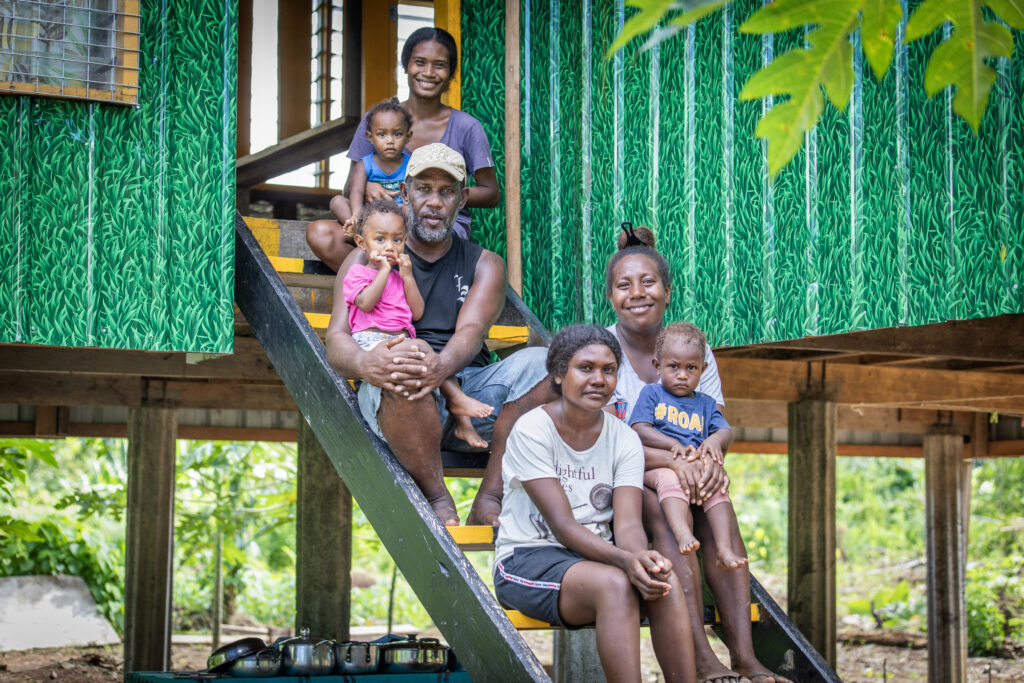
Rethinking Reintegration in Pacific Labour Mobility The theme of this year’s Pacific Labour Mobility Annual Meeting (PLMAM), “Sustainable Reintegration Begins with Fair and Effective Recruitment”, raises an important question: what does reintegration really mean in the context of Pacific labour mobility? For seasonal workers in New Zealand’s Recognised Seasonal Employer (RSE) scheme, time away is usually six months, after which they must return home for at least five months before being eligible to recruit for the RSE again. Unlike the nine-month PALM visas in Australia, there is no pathway to a longer-term stay from the RSE visa. On the face of it, reintegration after six months is not likely to be a major issue for recruits who work for one or two seasons. Only 40 percent of the 56,500 recruits for the RSE since 2007 have returned for three or more seasons. The picture changes when absences accumulate year after year. For workers who leave, say, Samoa for six months annually, repeating this cycle for four or more years, the rhythm of absence and return inevitably creates family and community challenges. Adjusting to life at home after repeated long absences is not always seamless. Social stresses, family expectations, and even rumours about workers’ behaviour abroad can complicate the return. This is why the theme of this year’s meeting is so timely. Reintegration is not just about coming home once — it’s about managing the long-term impacts of seasonal as well as long-term cyclical migration. Fair and effective recruitment lies at the heart of sustainable reintegration, writes the author. Shifts in Labour Mobility The broader labour mobility landscape in the Pacific has been transformed dramatically over the past decade, particularly in Australia. Until the introduction of the Seasonal Worker Programme, the forerunner to today’s Pacific Australia Labour Mobility (PALM) scheme, Pacific people had no dedicated migration channel into Australia’s workforce. The PALM scheme, particularly its long-term stream, marks a significant policy shift. For the first time in over a century, Australia opened long-term, low-skilled and semi-skilled labour pathways for Pacific people. This is a profound change, one that mirrors New Zealand’s longer history of engagement. Australia has invested heavily in staffing, administration, and support to make the scheme work both onshore and in labour sending countries. Meanwhile, New Zealand’s RSE scheme continues to provide opportunities, though demand there has plateaued. In recent years, the cap on RSE numbers has not been reached. Rising costs for employers, from compliance and accommodation to pastoral care, have curbed demand. In Samoa, for example, New Zealand approved employers now pay a fee per Samoan worker, and Samoan workers themselves also face new costs. These financial pressures, on both sides, are shaping the trajectory of recruitment. Recruitment, Fairness, and Reintegration Fair and effective recruitment lies at the heart of sustainable reintegration. Labour sending countries often want to distribute opportunities equitably, ensuring that benefits are shared across communities. Yet recruitment often happens through established relationships between employers and experienced workers, who are then asked to recommend new candidates. While this system provides continuity, it risks limiting access for those outside the existing networks. Governments in countries such as Samoa, Tonga, and Vanuatu have sought to centralise recruitment through Labour Sending Units (LSUs). But balancing fairness with employers’ preferences remains a challenge. The critical question is how to ensure that workers participate with a clear plan for their earnings — whether that is education costs, housing, or small business ventures — rather than treating seasonal work as a lifestyle of permanent dependency on cash incomes earned through temporary labour migration overseas. In New Zealand, where workers must always return home, reintegration planning is essential to ensure maximum benefit from short-term circular migration. In Australia, where transitions from short-term to long-term PALM visas are possible, the pressures on families can be even greater, with absences stretching to years. The challenges of reintegration are different in this context. For some families, temporary work overseas has become a primary livelihood strategy, even passed down across generations. While remittances are vital, this kind of dependency risks undermining local livelihoods in the long term. Reintegration is not just about coming home once, writes the author. It’s about managing the long-term impacts of seasonal as well as long-term cyclical migration. The Changing Labour Market Looking ahead, sustainability will depend on recognising shifts in global and regional labour markets. Technological change, particularly automation, is already reshaping demand. In New Zealand, for instance, pack houses that once employed large numbers of women are becoming increasingly automated, reducing the need for seasonal labour. Technology will continue to disrupt traditional roles. Consumer expectations are also evolving. Major international buyers of agricultural products are scrutinising labour conditions more closely. Questions around ethical recruitment, modern slavery, and cost-sharing practices are now influencing whether large companies choose to buy Australian and New Zealand produce. For example, comparisons are being made between the costs borne by temporary migrant workers in New Zealand versus those recruited in the United States, where employers are often required to cover transport fully. These perceptions matter and will affect the long-term viability of Pacific labour mobility schemes. Priorities for Sustainability To keep Pacific labour mobility successful and sustainable, several priorities stand out. First, costs must remain manageable for both approved employers and workers. If participation becomes too expensive, demand will decline, and workers will struggle to send meaningful remittances home. Second, labour sending countries must play a proactive role in promoting fair recruitment and supporting reintegration. This means ensuring access is broad-based and encouraging workers to have long-term financial plans for their earnings. It also means discouraging the pattern where families become wholly reliant on seasonal migration, which may not be viable in the long run. Finally, stakeholders must keep pace with global shifts, from technology to consumer standards. Ethical recruitment, decent working conditions, and transparency will increasingly be non-negotiable in global supply chains. If PALM and RSE schemes can stay ahead of these expectations, they will remain attractive to both approved employers and consumers. Returning
Regional Workshop Advances Implementation of Tariff Commitments under PACER Plus
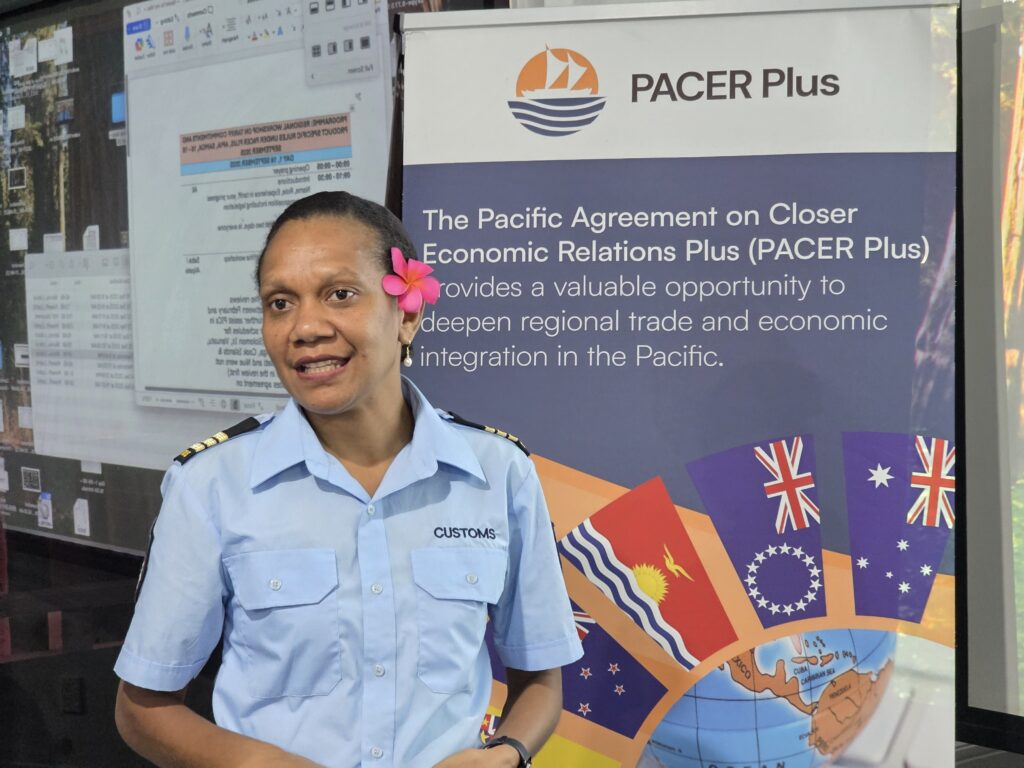
APIA, Samoa – Customs officials from eight Pacific Island countries have concluded a three-day Regional Workshop on Transposition of Tariff Commitments and Product-Specific Rules (PSRs) under the Pacific Agreement on Closer Economic Relations Plus (PACER Plus). The workshop, held in Apia, Samoa, from 16-18 September 2025, brought together officials from the Cook Islands, Kiribati, Niue, Samoa, Solomon Islands, Tonga, Tuvalu, and Vanuatu. The workshop was designed to help countries align their PACER Plus tariff schedules and product-specific rules with the latest version of the Harmonised System (HS), an internationally standardised system of names and numbers used to classify traded products. Periodic updates to the HS ensure that trade rules keep pace with new products and changing technologies. Ms. Sisilia Asel Lui from Vanuatu Customs and Inland Revenue makes a point at the workshop. For Pacific Island member countries of the PACER Plus, updating tariff commitments and PSRs is essential to ensure that goods can move freely and fairly across borders of the PACER Plus Parties. Without these updates, countries risk inconsistencies in how goods are treated, which could create unnecessary trade barriers, confusion for traders, and revenue collection implications. “HS 2022 introduced over 350 sets of amendments to product classifications, and Pacific Island countries need to update their commitments to reflect these changes. This workshop provided a valuable opportunity to work through technical issues together, harmonise approaches, and set realistic timelines for implementation.” Mr. Saba Vallipuram, Tariff and Rules of Origin Expert, who has been assisting PACER Plus countries with this process since early 2025 As of January 2025, countries were at different stages of updating their tariff commitments. Samoa, Tonga, and Vanuatu have made progress with draft HS2022 transposed schedules, while others such as Kiribati and Tuvalu were slightly behind. The Solomon Islands recently finalised its updated tariff schedule. This week’s workshop has helped remaining countries, particularly Kiribati and Tuvalu, to take concrete steps towards completing their schedules. It also equips countries with the knowledge and tools for the next transposition to HS2028. Mrs. Annette Kotela Ibe, Team Leader Technical at the Ministry of Finance’s Customs and Excise Division in Solomon Islands, noted the importance of the workshop for building regional consistency: “For Pacific Island countries like ours, aligning tariff commitments and product-specific rules is not just about compliance. It’s also about creating a level playing field for our businesses. This workshop gave us clarity and practical tools to move forward. It also reassures traders that PACER Plus countries are committed to facilitating trade in a fair and transparent way.” Customs officials from eight Pacific Island countries at the three-day Regional Workshop on Transposition of Tariff Commitments and Product-Specific Rules under PACER Plus in Apia, Samoa. At the close of the workshop, participants agreed on next steps to finalise their updated tariff commitment schedules, address pending comments from earlier technical reviews, and complete the necessary legislative processes to adopt the new transposed HS2022 schedules. For Pacific exporters and importers, this work means simpler, clearer, and more predictable trade rules. For governments, it strengthens the foundation for economic growth by ensuring that PACER Plus continues to deliver on its promise of expanding regional trade and investment. -ENDS- More articles like this one
PACER Plus Implementation Unit attends FTOM and FTMM in Fiji

SUVA, Fiji – The Forum Trade Officials and Trade Ministers meeting was convened on 16-18 July 2025 in Suva, Fiji, to deliberate on key trade issues affecting the Pacific region, against the backdrop of an increasingly complex global and regional economic landscape. Ministers reaffirmed their commitment to a rules-based multilateral trading system to enhance the region’s gains from international trade. The geographic development challenges of the region further underscored the critical need for increased regional integration through regional initiatives that reflect the region’s collective needs and priorities. These initiatives include the 2050 Strategy for the Blue Pacific Continent, the Pacific Roadmap for Economic Development (PRED), and the Pacific Aid for Trade Strategy. The draft Pacific Regional Labour Mobility Principles were also considered as directed by Forum Leaders in 2023. Hon. Peter Shanel Agovaka, Minister of Foreign Affairs and External Trade of Solomon Islands, delivered a statement on behalf of the PACER Plus Parties, highlighting progress and milestones since the Agreement entered into force in 2020. In his remarks, Hon. Agovaka highlighted the integral role of PACER Plus in promoting regional economic integration through reducing barriers to trade and optimising opportunities in trade in goods, services trade, investment and labour mobility. While reaffirming PACER Plus Parties commitment to a predictable rules-based trading system, Hon. Agovaka also encouraged other Forum members’ accession to PACER Plus to increase the impact of the Treaty and to further deepen regional economic integration in the Pacific. During the meeting, Ministers approved observer status for the PACER Plus Implementation Unit (PPIU) to the Forum Trade Ministers Meeting. The PPIU welcomed this decision as a strategic step towards enhancing regional trade coordination and participation in key regional trade discussions. The PPIU also used the opportunity during the meeting to meet with regional partners to discuss alignment of priorities and collaboration opportunities. -ENDS- More articles like this one
